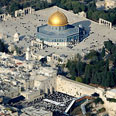
Jerusalem's Temple Mount
צילום: איי פי
Jerusalem’s Old City must remain united
Capital’s Arab neighborhoods should be handed over, but not Old City
When the day arrives when we set the permanent borders for this country, we will be forced to consider territorial compromise in Jerusalem. Just as we do just fine without Gaza or Khan Younis, so too we will manage without Jerusalem's Issawiya, A-Ram or Tsur Baher neighborhoods.
We had better get used to this idea if we want to ensure Israel has a capital with a Jewish majority.
In an eventual final-status agreement, metropolitan Jerusalem will include two capitals: Jewish Jerusalem and Palestinian al-Quds, divided by a clear border.
A quarter-million Palestinians today live in Jerusalem's jurisdiction. They are not Israeli citizens, nor will they ever be. There can be no justification for annexing them to us.
On the other hand, the Old City and its surroundings must remain whole, and there must be special arrangements to ensure free access for members of all faiths.
No negotiations with terror
But alas, in light of Palestinian terrorism, it appears there will be no discussions about a permanent solution in Jerusalem any time soon.
Still, the general guidelines are already clear: Jewish-Israeli sections of the city – mainly the western part of the city and the new neighborhoods built since 1967 will be an inseparable part of our Jerusalem. The Arab parts of the city's eastern half and the surrounding villages – will be for the Palestinians.
The Old City will remain undivided, and there will be special arrangements to preserve our link to Jewish holy places and ensure free access for members of all religions.
Semi-independent council
And what happens until then? One possible solution would be to create a joint municipal council, under special authority and semi-independent.
The council will have limited authority with regard to security, law enforcement, public services and infrastructure. The council will operate joint courts that will serve as an agreed upon arena to hear "light" criminal cases.
Thus, we will put off, at least for the moment, questions of sovereignty that will be dealt with in a final status agreement, and will make it possible for each side to have fair representation.
This model of cooperation, that would answer the needs of residents and politicians alike, has been developed through unofficial initiatives in recent years.
Dialogue doesn't kill
When negotiations between Israel and the Palestinians are finally concluded, There will be a demilitarized Palestinian state alongside Israel, based on the June 4, 1967 borders. There will be minor, mutually agreed-upon changes, and most residents living in large settlement blocs will be annexed to Israel.
Under no circumstances will Palestinian refugees be allowed to return to Israel, but rather they will be absorbed into the countries they now reside in, the Palestinian state, or other countries.
Despite the constraints of an Israeli election campaign, we must prepare public opinion for necessary compromise for the benefit of our future. Not with brainwashing or slogans.
Our leaders would do well to spend their time outlining an eventual agreement between the sides, because dialogue doesn't kill and doesn't injure.
Most of our public understands that separating from the Palestinians is an essential, emergency step for our future. Even in Jerusalem.
In order to accomplish this, we must renew negotiations in the context of the Road Map, and continue an uncompromising war against terrorism.










